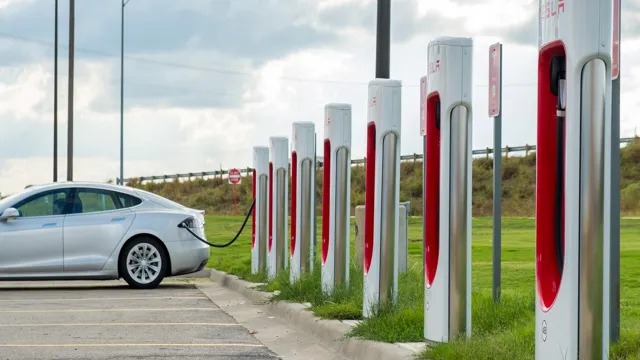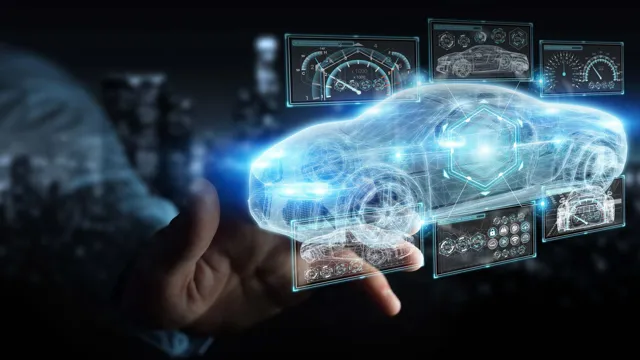Revolutionizing the Future of Transportation: Rochester Institute of Technology’s Groundbreaking Electric Cars Research
Have you ever wondered what efforts universities and research institutions are taking to promote sustainable energy technologies? At the Rochester Institute of Technology (RIT), research on electric cars has been gaining momentum in recent years. Led by a team of engineers and scientists, RIT’s research on electric cars aims to contribute to a cleaner environment and address the energy crisis. With the ever-growing demand for cleaner and sustainable energy sources, electric cars have become an increasingly popular alternative to traditional gas-run vehicles.
This blog will explore RIT’s research on electric cars and how it provides a glimmer of hope for a more sustainable future.
Impact of Electric Cars on Environment
Rochester Institute of Technology (RIT) has been conducting extensive research on the impact of electric cars on the environment. One of their key findings is that electric cars emit significantly less greenhouse gas emissions than their gasoline-powered counterparts, making them a more sustainable and eco-friendly option. Additionally, RIT research has suggested that switching to electric cars could lead to significant reductions in air pollution and improve public health.
They found that the environmental benefits of electric cars extend beyond their lack of emissions, as they also create less noise pollution. This is particularly important in urban areas where noise pollution can be a major issue. RIT’s research has shown that the adoption of electric cars could play a significant role in reducing our carbon footprint and moving towards a more sustainable future.
Statistics on Pollution Emission Reduction
Electric Cars Looking at the statistics on pollution emission reduction, it’s clear that electric cars have a significant impact on the environment. Compared to traditional gas-powered cars, electric vehicles emit zero tailpipe pollutants, which can help to reduce air pollution and improve air quality in urban areas. In fact, studies have shown that electric cars can reduce hazardous air pollutants by up to 90%.
Additionally, electric cars can reduce greenhouse gas emissions, which are the main cause of climate change. It’s estimated that electric cars produce 30% less CO2 emissions than their gas-powered counterparts. So, not only can electric cars help to clean up our air, but they can also help to combat climate change by reducing our carbon footprint.
While electric cars may not be able to solve all of our environmental problems, they certainly can help to make a positive impact.

Cost Savings for Consumers
One of the biggest reasons why electric cars are becoming increasingly popular is their potential for cost savings for consumers. In the long term, electric cars can be more affordable to run and maintain than traditional gasoline-powered cars. Firstly, electric cars require far less maintenance than gas-powered cars because they have fewer moving parts.
Secondly, the cost of electricity is typically more stable than the cost of gasoline, which fluctuates frequently. This means that EV drivers can save money on fuel costs in the long term. And finally, many countries and regions offer incentives and tax breaks for EV drivers, making it even more affordable to own an electric car.
These benefits make electric cars a financially savvy choice for those looking to save money in the long term. And, of course, the environmental benefits of electric cars can’t be ignored either. By switching to an electric car, consumers can significantly reduce their carbon footprint, helping to combat climate change.
RIT Research on Electric Cars
Rochester Institute of Technology is leading the way in research on electric cars. Their teams of engineering experts and scientists are investigating various aspects of electric car technology, such as battery storage, energy efficiency, and the environmental impact of these vehicles. Through their work, they are discovering innovative ways to make electric cars more accessible, affordable, and sustainable.
One of the most significant breakthroughs that RIT researchers have made is in the field of renewable energy, which aims to reduce dependency on fossil fuels. By collaborating with industry partners and policymakers, RIT is at the forefront of developing electric car technology that will power a sustainable transportation future. The research being done at RIT is essential to creating a more environmentally friendly world.
Overview of RIT’s Research on Electric Cars
Rochester Institute of Technology (RIT) is at the forefront of researching electric cars, supporting and developing projects dedicated to advancing electric vehicle technology. Researchers at RIT are dedicated to improving the environmental impact of transportation while enhancing the efficiency of electric cars, so as to create a more sustainable future. RIT’s research on electric cars encompasses a wide range of areas, such as the development of battery technology, understanding the consumer market, and examining the infrastructure necessary to support electric cars.
The team of researchers at RIT have made numerous advancements in the field of electric cars, including designing more efficient battery thermal management systems, improving battery materials and using machine learning algorithms to optimize electric vehicle charging. The overall aim is to make electric cars more practical, reliable and affordable for consumers, and increase their adoption in the market so as to reduce the negative impact of traditional fossil fuel vehicles on the environment.
Innovative Design and Technology
RIT researchers have been making groundbreaking strides in the field of electric cars. With the increasing awareness of climate change and the pressing need to reduce carbon emissions, electric vehicles (EVs) are gaining popularity as a cleaner alternative to their gasoline-powered counterparts. RIT’s research focuses on developing technology that can improve the efficiency and affordability of electric cars.
One such project is the development of a wireless charging system that eliminates the need for cables and makes charging more convenient. Another project aims to improve battery performance by developing new lithium-ion battery materials that can store more energy and last longer. The research team is also working on new power electronics systems that can better convert the energy stored in batteries to power the car’s motor.
With these innovations, RIT is paving the way towards a sustainable future in transportation, and making electric cars more accessible for everyone.
Collaboration with Industry Leaders
Collaboration with Industry Leaders: RIT Research on Electric Cars Rochester Institute of Technology (RIT) has been making significant strides in the field of electric cars, thanks to its collaboration with industry leaders. Electric cars have become a topic of great interest in the automotive world as alternatives to gasoline-powered vehicles. RIT’s research on electric cars includes the development of high-efficiency technologies, such as batteries and motors, as well as innovations in charging infrastructure.
The university’s research team has been working in partnership with industry leaders to develop solutions that will make electric cars more efficient, affordable, and accessible to consumers. RIT’s research on electric cars is crucial in reducing reliance on fossil fuels and reducing carbon emissions. The university is playing a significant role in developing technologies that will revolutionize the transportation industry.
Electric cars offer an eco-friendly solution to the challenges posed by traditional vehicles, and researchers at RIT are working tirelessly to make them more widespread. As a result of collaboration with industry leaders, RIT’s research on electric cars is recognized worldwide, and the university is striving towards further progress.
Future of Electric Cars
Rochester Institute of Technology (RIT) is at the forefront of electric cars research. The team at RIT is developing innovative technologies that could be the future of the automotive industry. Electric cars are becoming more popular as people seek to reduce their carbon footprint and save money on fuel costs.
RIT researchers are working on improving battery efficiency and increasing the range of electric cars. They are also exploring new materials and manufacturing techniques to make cars more durable and sustainable. With the increasing availability of renewable energy sources, electric cars could revolutionize the transportation sector.
RIT is playing a crucial role in shaping this future by conducting groundbreaking research and providing education on the benefits of electric cars. With their cutting-edge technologies, RIT is paving the way for a cleaner, greener and more sustainable future.
Technological Advancements Expected in Future
As technology continues to evolve, the future of electric cars is looking brighter than ever before. With advancements in battery technology, charging infrastructure, and autonomous driving systems, it’s clear that electric cars are no longer just a niche market. Some of the biggest names in the automotive industry are investing heavily in electric vehicle research and development, and consumers are starting to take notice.
Improved battery technology, for example, is making it possible for electric cars to travel further on a single charge, while faster charging times are making it easier to stay on the road for longer periods of time. Additionally, many electric car manufacturers are experimenting with autonomous driving systems, which could revolutionize the way we drive and travel. With all these exciting developments on the horizon, it’s clear that the future of electric cars is looking very promising indeed.
Potential for Widespread Adoption
The future of electric cars looks promising for widespread adoption. With advancements in technology, electric vehicles are becoming more efficient and affordable. Governments are also offering incentives for purchasing electric cars, which is making them more accessible than ever before.
The increase in charging stations and the expansion of the grid will make it easier for people to charge their electric cars, which has been a major concern for many potential buyers. As more people start driving electric cars, the infrastructure will continue to improve and become more efficient. The automotive industry is also investing heavily in electric vehicles, which will only accelerate the transition from gas-powered cars to electric cars.
It’s an exciting time for the automotive industry, and it’s clear that electric cars will play a significant role in the future of transportation.
Conclusion
In summary, the Rochester Institute of Technology has charged full speed ahead in their research on electric cars. Thanks to their innovative approaches, such as exploring the use of renewable energy sources and advanced battery technology, they are bringing new life to the electric vehicle market. As they continue to break new ground and push the limits of what is possible with modern electric cars, we can only imagine just how electrifying the future of transportation will be.
“
FAQs
What is the focus of Rochester Institute of Technology’s research on electric cars?
Rochester Institute of Technology’s research on electric cars focuses on improving their efficiency and addressing the challenges associated with their adoption, such as infrastructure and battery technology.
How is Rochester Institute of Technology working to improve the battery technology of electric cars?
Rochester Institute of Technology is researching and developing new battery chemistries and manufacturing techniques to improve the energy density, cost, and safety of electric vehicle batteries.
What are some of the infrastructure challenges that electric cars face?
Lack of charging infrastructure and slow charging times are among the infrastructure challenges that electric cars face. Rochester Institute of Technology is researching and developing solutions to address these challenges, such as wireless charging technology and smart grid integration.
How does Rochester Institute of Technology’s research on electric cars contribute to sustainability?
Rochester Institute of Technology’s research on electric cars contributes to sustainability by reducing the reliance on fossil fuels and addressing the environmental impacts of transportation. It also helps to promote the adoption of clean energy technologies and reduce greenhouse gas emissions.







